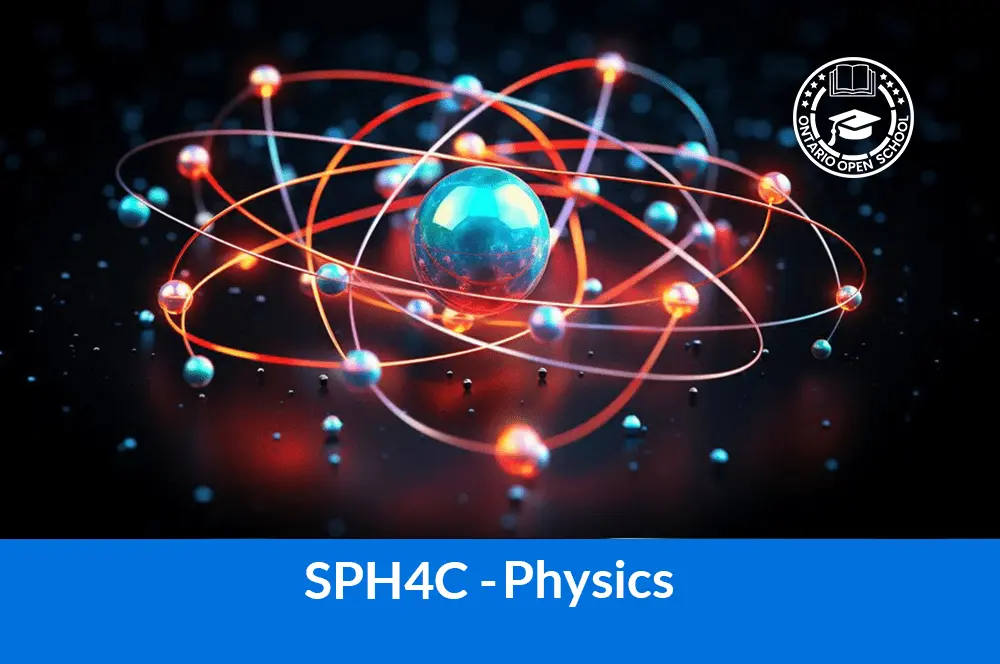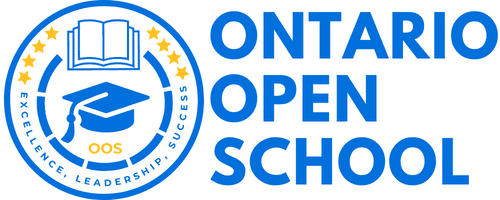- info@ontarioopenschool.com
- 647-494-4499
-
Unit 100 - 29 Gervais Drive, North York, ON.
M3C 1Y9
Copyright 2024 Ontario Open School Inc. All Rights Reserved.
This course develops students’ understanding of the basic concepts of physics. Students will explore these concepts with respect to motion; mechanical, electrical, electromagnetic, energy transformation, hydraulic, and pneumatic systems; and the operation of commonly used tools and machines. They will develop their scientific investigation skills as they test laws of physics and solve both assigned problems and those emerging from their investigations. Students will also consider the impact of technological applications of physics on society and the environment
Unit Order | Unit Name | Suggested Time |
|---|---|---|
| Unit 1 | Motion and Its Applications Students will develop an understanding of how all motion involves a change in the position of an object over time and describe this concept using mathematical relationships. Many technologies that utilize the principles of motion will be assessed for their impact on society and the environment. | 22 hours |
| Unit 2 | Mechanical Systems Students will demonstrate an understanding of how mechanical systems use force to do work. They will develop skills to describe the operation of mechanical systems using mathematical relationships. The influence that friction as a force has on the design, use, and effectiveness of mechanical systems will be explored. Finally, students will assess the ways in which mechanical systems can be used to address social and environmental challenges. | 21 hours |
| Unit 3 | Electricity and Magnetism In this unit, students will understand the predictability of the relationships between electricity and magnetism, as well as, their many technological applications. They will further explore both the positive and negative effects on society and the environment of technological applications that use electricity and magnetism. | 21 hours |
| Unit 4 | Energy Transformations Students will demonstrate an understanding of how energy can be transformed from one type to another and that systems that involve energy transformations are never entirely efficient. They will evaluate the responsible use of technological applications that involve energy transformations based on both the negative and positive effects these processes can have on society and the environment. | 18 hours |
| Unit 5 | Hydraulic and Pneumatic Systems Students will develop an understanding of how fluids under pressure can be used to do work and have predictable properties that make them useful in many technological applications. They will also assess the social and economic consequences of the use of hydraulic and pneumatic systems. | 20 hours |
| Final Evaluation 30% | Final Project Final Exam | 6 hours 2 hours |
| Total | 110 Hours |
A wide variety of instructional strategies are used to provide learning opportunities to accommodate a variety of learning styles, interests and ability levels. These strategies include, but are not limited to:
| Oral Presentation | Activity Learning Centers | Carousel | Guided Exploration |
| Discussion | Think Pair Share | Lecture | |
| Socratic Lesson | Visual Stimuli | Worksheet | |
| Independent Study | Note Making | Inquiry Process | |
| Research Process | Scientific Method | Concept Map | |
| Computer Assisted Instruction | Media Presentation | Jigsaw | |
| Consequence Map | Flow Chart | Brainstorming | |
| Mind Map | Role Play | Demonstration | |
| Problem Solving | Experimenting | Reflection |
Purpose
The primary purpose of assessment is to improve student learning. Assessment relates directly to the expectations for the course.
A variety of assessments for and as learning are conducted on a regular basis to allow ample opportunities for students to improve and ultimately demonstrate their full range of learning and for the teacher to gather information to provide feedback. Assessment tasks relate to the success criteria set out in lesson plans. Success criteria allow students to see what quality looks like.
Evaluation is the process of judging the quality of student work in relation to the achievement chart categories and criteria and assigning a percentage grade to represent that quality. Evaluation is based on gathering evidence of student achievement through:
Assessment for Learning – we provide feedback and coaching.
Assessment FOR Learning is the process of seeking and interpreting evidence for the use of learners and their teachers to decide where the learners are in their learning, where they need to go, and how best to go there.
Assessment as Learning – we help students monitor progress, set goals, reflect on their learning
Assessment AS Learning is the process of the explicit fostering of students’ capacity over time to be their own best assessors, but teachers need to start by presenting and modeling external, structured opportunities for students to assess themselves.
Assessment of Learning – we use assessments to provide evaluative statements about student achievement. Assessment OF Learning is the assessment that becomes public and results in statements of symbols
(marks/grades/levels of achievement) about how well students are learning. It often contributes to pivotal decisions that will affect students’ future.
ASSESSMENT TOOLS
| Assessment for Learning | Assessment as Learning | Assessment of Learning | |
| Conversation | – Student teacher conferences
– Small group discussions – Pair work – Peer-feedback |
– Student teacher conferences
– Small group discussions – Pair work – Debate – Oral pre-tests – Oral quizzes |
– Student teacher conferences – Question and answer session – Oral tests |
| Observation | – Class discussions
– Independent study in class – Self analysis – Peer Analysis |
– Whole class discussions
– Debate – Self analysis – Peer Analysis |
– PowerPoint presentations – Performance tasks – Debate |
| Student Product | – Assignment
– Quizzes – note book checks – Learning Logs (anecdotal)
|
– Quiz
– Journals – Assignment – Rough drafts – Portfolios – Posters (rubric/scale) – Graphic organizers – Homework checks – Entrance tickets – Exit tickets |
– Quiz – Assignment – Tests – Posters (rubric) – Exam – Essays |
Resources
Grading
Weighting of categories
| Knowledge/Understanding | Thinking/Inquiry | Communication | Application |
| 25 % | 25 % | 25 % | 25 % |

Course Grade | Grade 12 |
|---|---|
Course Code | SPH4C |
Course Category | Science |
Course Type | College Preparation |
Course Delivery | Online |
Course Duration | 110h |
Course Credit | 1.00 |
Copyright 2024 Ontario Open School Inc. All Rights Reserved.
